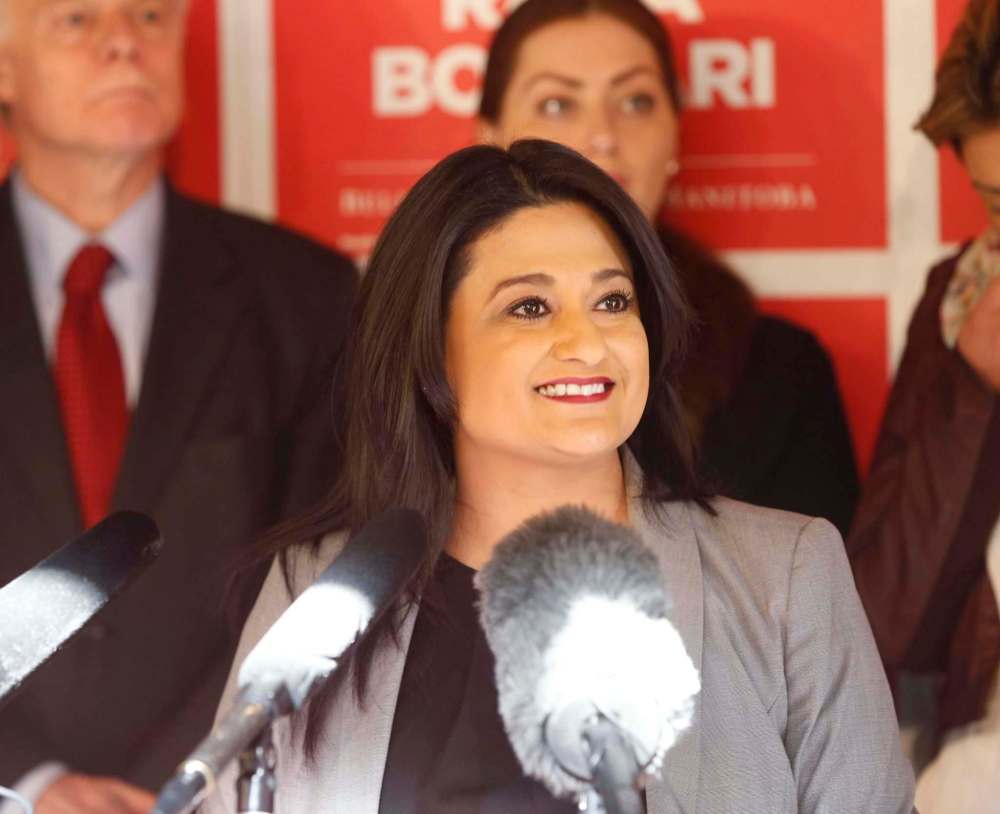Liberals’ fiscal plan leans on ‘magic bean’ — but so do NDP, Tories
Advertisement
Read this article for free:
or
Already have an account? Log in here »
To continue reading, please subscribe:
Monthly Digital Subscription
$1 per week for 24 weeks*
- Enjoy unlimited reading on winnipegfreepress.com
- Read the E-Edition, our digital replica newspaper
- Access News Break, our award-winning app
- Play interactive puzzles
*Billed as $4.00 plus GST every four weeks. After 24 weeks, price increases to the regular rate of $19.00 plus GST every four weeks. Offer available to new and qualified returning subscribers only. Cancel any time.
Monthly Digital Subscription
$4.75/week*
- Enjoy unlimited reading on winnipegfreepress.com
- Read the E-Edition, our digital replica newspaper
- Access News Break, our award-winning app
- Play interactive puzzles
*Billed as $19 plus GST every four weeks. Cancel any time.
To continue reading, please subscribe:
Add Free Press access to your Brandon Sun subscription for only an additional
$1 for the first 4 weeks*
*Your next subscription payment will increase by $1.00 and you will be charged $16.99 plus GST for four weeks. After four weeks, your payment will increase to $23.99 plus GST every four weeks.
Read unlimited articles for free today:
or
Already have an account? Log in here »
Hey there, time traveller!
This article was published 28/03/2016 (3486 days ago), so information in it may no longer be current.
There comes a moment in every election campaign when a party leader has to come up with a price tag to attach to his or her pledges.
It is a moment of truth for that leader. Succeed in convincing the media, and the voters, that you have a handle on the cost of your promises, and good things tend to happen on election day. Fail to provide a credible, reasonably accurate accounting of promises and a forecast of how it will impact the budget in the future, and it can bring a campaign to its knees.
On Monday, Liberal Leader Rana Bokhari became the first of the three main party leaders to face this moment of truth. Although it may be too soon to predict the exact fallout, it is hard to see how the plan she unveiled is going to generate the kind of support necessary to make the Liberals a true force in Manitoba politics.

In short, the Liberal plan was sloppy and incomplete.
Supporting documentation that purported to forecast the declining budget deficit over the next seven years did not make sense because it did not include the cost of new Liberal spending pledges made in this campaign.
Debt servicing costs seemed much too small, and did not increase year over year, an unlikely scenario when the budget will be in deficit – and thus relying on borrowed money to pay for program costs – for at least another half decade.
Those rough edges aside, Bokhari said her plan would ultimately return the treasury to balance because a Liberal government would bring a measure of fiscal discipline missing from the NDP government. This would allow a Liberal government to identify and eliminate wasteful or ineffective programs, which in turn would mean smarter spending decisions and better overall outcomes without huge increases in expenditures.
And if there are unforeseen demands for more money – a crisis in health care or family services, or a natural disaster – then that’s okay too. Bokhari said she would just run higher deficits.
This is an approach we could call the “magic bean” strategy for fiscal planning: no significant cuts in services or spending, no new or higher taxes, and a budget that will balance itself when the economy, like the metaphorical bean, magically expands and floods the province with new tax revenue.
If that sounds familiar, it should; it’s essentially what the NDP and Progressive Conservatives have promised.
New Democrats have argued that by holding spending increases to a reasonable level (so far undefined), they can eventually bring the budget back into balance as the economy grows. The Tories have countered with a plan to bring down annual increases in spending by one per cent. Like the NDP, the Tories haven’t identified a ceiling for spending increases, or how it would impact specific departments. Nor have they accounted for legitimate and unforeseen demands on expenditures other than to find efficiencies and waste through an audit of government programs.
The Tories and Liberals want voters to believe that the NDP government has spent itself into a structural deficit. In fact, a review of the actual numbers shows only modest increases in overall spending since the recession hit in 2008. Unfortunately, revenue growth has been even more modest. Hence, the deficits.
Pointing an accusing finger at the NDP for its deficits will not change the fact that a Liberal or PC government will inherit the same dilemma.
Other governments facing the same predicament have taken two primary approaches: some provinces, notably British Columbia, slowed spending and increased taxes; others, primarily Ontario and Quebec, have attacked the problem by cutting back on spending in a manner that is dangerously close to a spending freeze.
So far, none of the three parties in the Manitoba election seems willing to prescribe tough measures to bring balance back to the Manitoba budget.
Asked if she would consider increased taxes to combat the deficit, as Liberal Premier Christy Clark did in B.C., Bokhari uttered a resounding “no.”
Again, that puts her in lock step with NDP Leader Greg Selinger and Tory Leader Brian Pallister, the latter of whom is promising to roll back the PST hike introduced by the NDP to fund infrastructure without any clear plan on how to replace that $300 million generated annually by that one point.
Preserving and enhancing core services is important to voters. In fact, based on the result of last fall’s federal election, where a resurgent federal Liberal party soared to victory on a promise to expand the role of government in the lives of Canadians, it might be the most important issue for voters.
However, at some point deficit financing has to come to an end. At some point, some future Manitoba government will be forced to cut spending and core services and maybe even raise taxes just to put an end to the borrowing debt accumulation.
And then, we’ll all be wondering why, when the problem was not as big or as urgent, someone couldn’t have come up with a plan that involved more than good intentions, luck and the limitless potential of a magic bean.
dan.lett@freepress.mb.ca

Dan Lett is a columnist for the Free Press, providing opinion and commentary on politics in Winnipeg and beyond. Born and raised in Toronto, Dan joined the Free Press in 1986. Read more about Dan.
Dan’s columns are built on facts and reactions, but offer his personal views through arguments and analysis. The Free Press’ editing team reviews Dan’s columns before they are posted online or published in print — part of the our tradition, since 1872, of producing reliable independent journalism. Read more about Free Press’s history and mandate, and learn how our newsroom operates.
Our newsroom depends on a growing audience of readers to power our journalism. If you are not a paid reader, please consider becoming a subscriber.
Our newsroom depends on its audience of readers to power our journalism. Thank you for your support.
History
Updated on Monday, March 28, 2016 5:00 PM CDT: Headline changes










